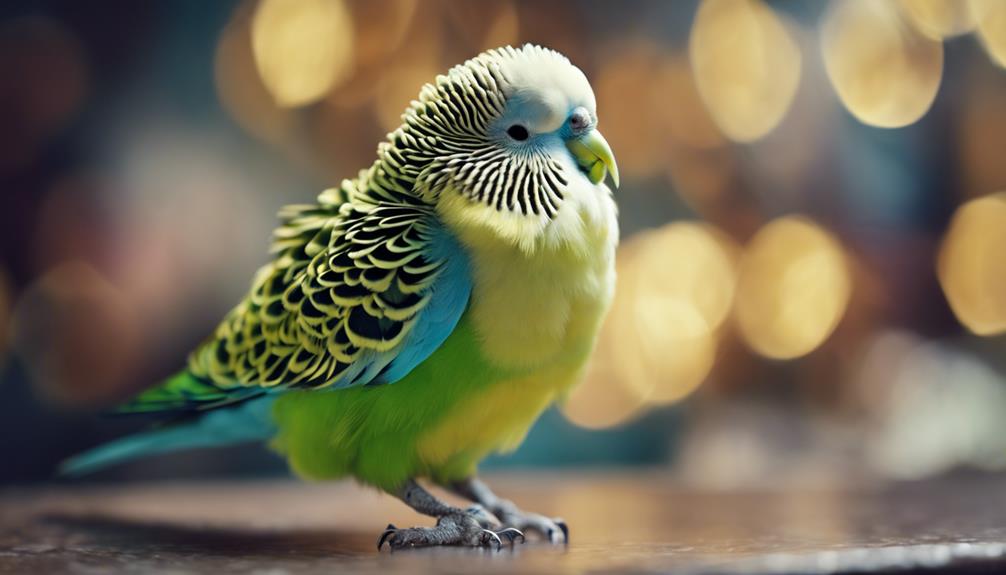What Signs of Illness to Watch For in Your Budgerigar (Budgie)

Signs of Illness in Budgerigars:
Stay vigilant for changes in movement and behavior, as they can indicate your budgie’s health.
Understanding these signs is crucial for their well-being and happiness.
Physical Symptoms to Look Out For
When observing budgerigars for signs of illness, one should pay close attention to physical symptoms that may indicate a health concern. Dietary deficiencies can manifest in various ways, such as abnormal feather molting. Feathers are a reflection of a budgerigar’s overall health, and any irregularities in their appearance could signal underlying issues.
Additionally, maintaining proper cage cleanliness is crucial, as a dirty environment can lead to respiratory problems and other health issues. Environmental stressors, like loud noises or sudden changes in temperature, can also impact a budgerigar’s well-being.
It is essential to monitor your budgerigar for any changes in weight, posture, or physical appearance. A healthy budgie should have bright eyes, smooth feathers, and exhibit active behavior. Any signs of lethargy, fluffed-up feathers, or decreased appetite should prompt a closer examination and possible consultation with a veterinarian.
Behavioral Changes to Monitor
Owners of budgerigars should pay close attention to any unusual vocalizations their birds make, as this can indicate underlying health issues.
Additionally, changes in behavior such as lethargy or increased aggression should be monitored closely.
Being attuned to these behavioral shifts can help owners detect potential illnesses early and seek appropriate veterinary care.
Unusual Vocalizations
Monitoring unusual vocalizations in budgerigars is essential for detecting potential signs of illness early on. Changes in a budgie’s usual vocal patterns can indicate underlying health issues.
Pay attention to any excessive squawking, wheezing, or unusually quiet chirping. These vocalizations may be accompanied by other concerning symptoms like feather moulting patterns or beak abnormalities.
If your budgie’s vocalizations seem different or off, it’s crucial to observe for any feather discoloration or changes in feather quality. By being attuned to these vocal cues and accompanying physical signs, you can promptly seek veterinary care if needed.
Lethargy or Aggression
To ensure the well-being of your budgerigar, it’s crucial to observe for any signs of lethargy or aggression as these behavioral changes can signal underlying health issues. Here are three essential aspects to consider when monitoring your budgie’s behavior:
- Sleep patterns and stress indicators: Keep an eye on any significant changes in your budgie’s sleep routine. Disturbances in their usual sleep patterns could indicate stress or discomfort.
- Feathers and diet analysis: Check for any abnormalities in your budgie’s feathers, such as fluffing up constantly or changes in feather quality. Additionally, analyze their diet to ensure they’re receiving proper nutrition, as deficiencies can lead to behavioral changes.
- Behavioral cues: Note any uncharacteristic aggression or withdrawn behavior. These changes could be a sign of underlying health issues that require attention.
Signs of Respiratory Issues
At the first sign of wheezing or labored breathing in budgerigars, immediate veterinary attention is crucial to address potential respiratory issues. Respiratory problems in budgerigars can stem from various factors, including environmental conditions and genetic predispositions. Maintaining a clean and well-ventilated living space for your budgie is crucial in preventing respiratory ailments. Dust, smoke, strong odors, and drafts should be avoided as they can irritate your bird’s sensitive respiratory system. Additionally, genetic predispositions to respiratory issues can make some budgerigars more susceptible to developing problems.
Treatment options for respiratory issues in budgerigars may include medication, nebulization, or other veterinary interventions. However, prevention is always better than cure. Regular veterinary check-ups, a balanced diet, and a stress-free environment can help reduce the risk of respiratory problems in your budgie. By being proactive in monitoring your budgerigar’s respiratory health and seeking veterinary care at the first sign of trouble, you can ensure your feathered friend leads a healthy and happy life.
Digestive Problem Indicators
Budgerigar owners should be alert to signs of digestive issues in their pets. Vomiting or regurgitation, changes in droppings, and loss of appetite are key indicators to watch for.
If any of these symptoms are observed, it’s important to seek veterinary care promptly.
Vomiting or Regurgitation
When observing budgerigars, noticing any instances of vomiting or regurgitation may indicate potential digestive problems that require prompt attention. It’s essential to keep an eye out for these signs as they could be indicative of underlying health issues that need to be addressed swiftly.
- Dietary concerns: Sudden changes in diet or consuming spoiled food can lead to regurgitation in budgerigars.
- Regurgitation causes: Stress, infections, or even tumors in the digestive system can also trigger regurgitation in these birds.
- Medical intervention: Consulting an avian veterinarian is crucial for proper diagnosis and treatment if vomiting persists, as it could be a sign of a more serious condition requiring medical attention.
Changes in Droppings
Noticing changes in a budgerigar’s droppings can serve as important indicators of potential digestive problems that warrant attention. Color changes or texture differences can signal underlying health issues that need to be addressed promptly. Here is a table to help you understand what different changes in droppings could mean:
| Indicator | Description | Action Required |
|---|---|---|
| Green Droppings | Could indicate liver or gallbladder issues | Consult a vet immediately |
| Watery Droppings | Might suggest bacterial infection or dehydration | Provide fresh water and monitor closely |
| Blood in Droppings | Indicates potential internal bleeding | Seek urgent veterinary care |
If you notice any of these changes in your budgerigar’s droppings, it is advisable to seek professional advice to ensure your feathered friend’s well-being.
Loss of Appetite
Loss of appetite in budgerigars can be a concerning indicator of potential digestive issues that require careful attention and monitoring. When a budgie shows a lack of interest in food, it may be a sign of an underlying problem that needs to be addressed promptly. Here are some key signs to watch for:
- Weight Loss: A decreased appetite can lead to weight loss in budgerigars, which can further weaken their health and immune system.
- Unusual Colors: Changes in the color of their droppings or unusual colors around the beak area may indicate digestive disturbances.
- Feather Plucking and Unusual Behaviors: Birds that pluck their feathers or exhibit abnormal behaviors like lethargy or aggression could be experiencing digestive discomfort.
Monitoring your budgie’s appetite closely and seeking veterinary advice if you notice any of these signs is crucial for their well-being.
Skin and Feather Abnormalities
During their lifetime, budgerigars may exhibit skin and feather abnormalities that could indicate underlying health issues. Feather molt is a natural process for budgies, but excessive or abnormal molting patterns could be a cause for concern. If you notice your budgie losing feathers excessively or developing bald patches, it may be a sign of nutritional deficiencies, stress, or even parasitic infestations that require veterinary attention.
Skin lesions are another common issue to watch for in budgerigars. These can manifest as scaly patches, redness, swelling, or sores on the skin. Skin abnormalities can be caused by various factors such as infections, allergies, or injuries. Keeping a close eye on your budgie’s skin condition can help you catch any problems early on.
If you observe any unusual skin or feather changes in your budgerigar, it’s essential to consult with a veterinarian who specializes in avian care. Early detection and prompt treatment can help ensure the health and well-being of your feathered friend.
Eye and Beak Warning Signs
Should your budgerigar exhibit any abnormal signs in its eyes or beak, it’s crucial to address these warning signs promptly to safeguard its health and well-being. Paying attention to changes in these areas can provide valuable insights into your bird’s overall health status.
Here are some key warning signs to watch for:
- Feather Discoloration and Beak Abnormalities: Keep an eye out for any unusual changes in the color or texture of your budgie’s feathers, as well as any abnormalities in the shape or growth of its beak. These can indicate underlying health issues that require prompt attention.
- Eye Discharge and Beak Swelling: Excessive discharge from the eyes or swelling of the beak can be indicative of infections or injuries. It’s essential to monitor these symptoms closely and consult a veterinarian if they persist or worsen.
- Changes in Eating or Grooming Habits: Any sudden changes in your budgie’s eating or grooming habits, such as decreased appetite or reduced preening, could signal discomfort or illness. Observing these behavioral changes alongside eye and beak warning signs can help in determining the best course of action for your bird’s health.
Emergency Signs Requiring Immediate Attention
In cases of budgerigars displaying emergency signs requiring immediate attention, swift action is imperative to ensure the bird’s well-being and potentially save its life. If your budgie is experiencing severe symptoms such as difficulty breathing, sudden weakness, seizures, or profuse bleeding, it’s crucial to seek emergency vet care without delay.
When faced with a budgie in distress, it’s essential to remain calm and focused. Administering first aid techniques may help stabilize the bird while en route to the veterinary clinic. For instance, providing warmth by placing the bird in a covered, ventilated container with a heating pad set on low can be beneficial in cases of hypothermia.
Understanding common illnesses that affect budgerigars and practicing preventative care can also play a significant role in averting emergencies. Regular health check-ups, a balanced diet, and maintaining a clean environment can help keep your budgie healthy and reduce the likelihood of sudden health crises. Remember, quick action and preventive measures are key to ensuring the well-being of your beloved budgerigar.
Frequently Asked Questions
Can Budgerigars Develop Allergies to Certain Foods or Environmental Factors?
Budgerigars can develop allergies to certain foods or environmental factors. These allergies may manifest in symptoms like respiratory distress or skin issues. Preventive measures include keeping their environment clean and offering a varied, balanced diet.
How Often Should I Take My Budgie to the Veterinarian for Check-Ups?
Regular check-ups for your budgie are crucial. A vet visit annually, incorporating routine vaccinations, ensures optimal health. Watch for behavioral indicators of illness between visits. Remember, a healthy budgie is a happy budgie!
Are There Any Specific Supplements or Vitamins That Can Help Prevent Illness in Budgerigars?
Dietary supplements can boost a budgerigar’s immune system, aiding in preventative care. Vitamin deficiency is a concern; consult a vet for guidance. Administering proper supplements can help keep your feathered friend healthy and thriving.
Can Stress or Changes in Routine Trigger Illness in Budgerigars?
Stress management is crucial for budgerigars. Changes in routine can trigger illness. Maintaining a stable environment, providing enriching activities, and monitoring for signs of stress are essential for keeping your feathered friend healthy and happy.
How Can I Prevent the Spread of Illness to Other Birds in a Multi-Bird Household?
In multi-bird households, quarantine procedures are crucial to prevent illness spread. Implementing strict disinfection protocols and isolating sick birds can help in preventing transmission. By taking these measures, one can safeguard the health of all feathered companions.











